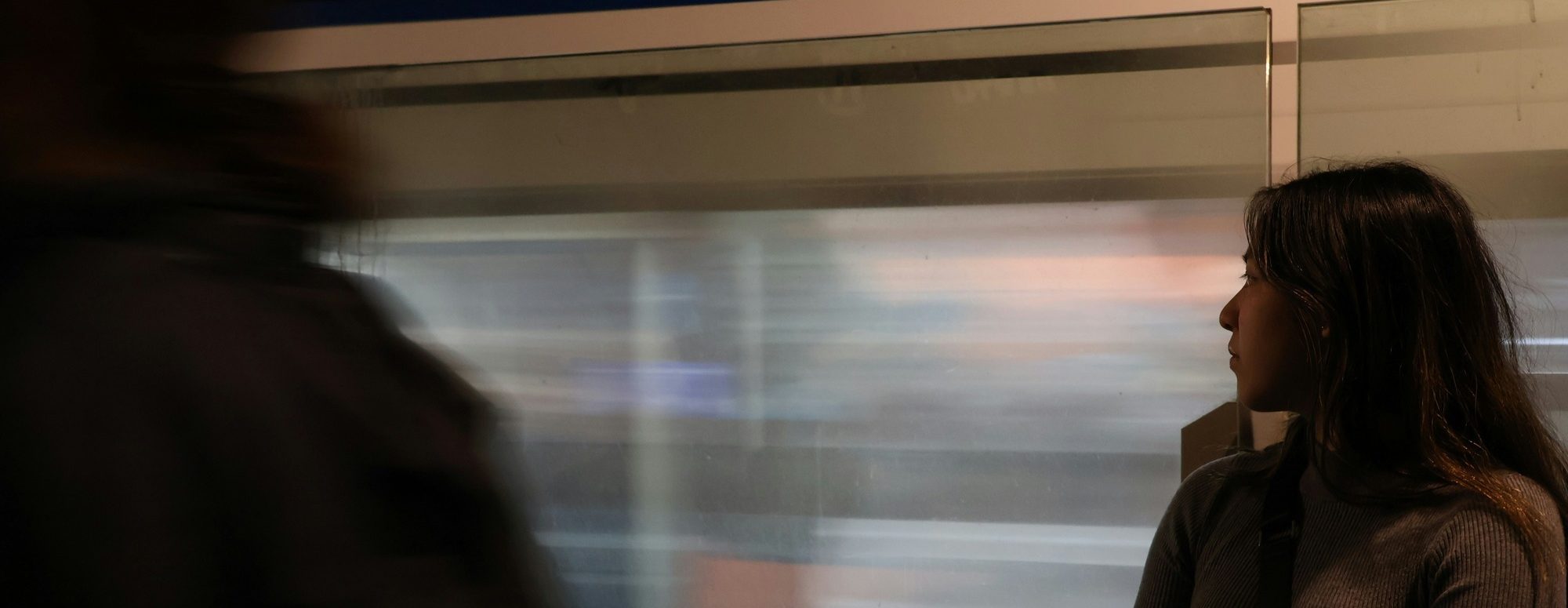Flash fiction feature: Linger On
The first time I saw her, she was coming in from Crocus Square.
Someone like my mother would never notice someone like her, but someone like me instantly did.
Her hair was ever so slightly greasy, a bit too long for her liking. It was clear.
The way she flicked the tendrils away as the train door shut and brought in a whoosh of wind
The way she flicked the tendrils away as the train door shut and brought in a whoosh of wind. The way she grabbed all her hair in a bunch so they wouldn’t touch her neck.
Something was stopping her from getting a haircut.
She wore an oversized yellow sweatshirt and some black joggers and those black Vans canvases that are perpetually on sale.
On another note, perhaps my mother would have noticed someone like her. She would have slightly upturned her eyebrows, gone back to her usual unassuming stare, waited for us to get out of the station we ended up in, wait till lunch time and then bring it up.
“You know, sometimes I wish I could also go around in my leisure wear,” she’d say.
“What do you mean?” I’d say.
“That girl…on the metro…” then she’d stare at me blankly, even though I knew what she was talking about from the get-go.
“Oh, yeah, I guess maybe she was going to the gym…”
“In that sweatshirt?”
“Hey, I dunno, I wore a jacket my first two years before…graduating to a tank top. You know us women, never comfortable with our bodies…”
“Hmm, maybe. I suppose.”
I’d notice someone like her because of what she exuded. Sometimes people walk into a room, or you walk into a room with someone already in there and notice that someone is exuding something. It could be something good, bad, or neither but it sure as hell is exuded, whatever it may be.
She exuded that same thing my first year Introduction to Literary Theory seminar tutor exuded whenever she taught us.
Ms Abrams was her name.
Ms Abrams would start off a sentence and it would keep flowing and flowing and flowing, and everyone would frantically start taking notes
Ms Abrams would start off a sentence and it would keep flowing and flowing and flowing, and everyone would frantically start taking notes. I wouldn’t know if her insights were all rehearsed with that lulling voice, or if she was simply pulling it all out of her head, but every single word would make sense. The poststructuralism and jingoism and subalternism from the un-ending, 3,500-page textbook with blobs of black ink would start to mean something.
Two weeks later, if someone would ask me to explain poststructuralism, I’d have no idea, but the moment I’d see my notes, I’d remember everything that was said by her, everything that was said in response, and everything I’d thought from what she’d said at that precise moment.
That was the yellow sweatshirt girl too.
That was a few people only.
I made a point to stare in passing. A few unrehearsed glances, my eyes flitting from place to place, never committing. I knew a few starers from back in the day. Boys who’d stare across the pub. The table. Just keep staring and never stop. Acquaintances.
Like I fascinated them. It wasn’t flattering. It was me as a spectacle.
She wasn’t a spectacle. Perhaps she was to me, but no one really is a spectacle, you know?
I felt a cold wind whistle past me, run down my spine in a violent jolt, and then I just stared at the door. Waiting for five minutes to pass.
“Are you okay?” She said, maybe five minutes later.
Who was she asking?
The voice was coming from in front of me, but she was right under my eyeline.
“Hey.” She tapped my arm. My arm.
I looked at her.
“Sorry, can I help you with anything?” I mumbled, finally pursing my lips into a curve.
“Slow morning?” She asked. She didn’t sound like a Westerner.
“I don’t…understand.”
“You were staring into the doors.”
“Oh yeah,” I nodded, “I do that.”
“Why?”
“Where else do I look?”
She seemed to consider responding.
“Where else would you look?” I asked her.
“I don’t…know.” She frowned, “I’ve never thought about it to be honest. I just…”
She trailed off.
“I just…keep looking around, keep seeing things, stop seeing them after a split second, keep looking around for something.”
“Interesting,” was all I could manage.
“But you looked sad.” Her voice was small now, and so small that I could grab at it and bottle it up and keep it with me forever.
“I always look sad.” It was true. When I was 15 and still in school, sixth graders would walk up to me at lunch and ask me if I was ‘depressed’. When I was 16 and close to getting out of hell, the Maths teacher would joke that I sounded so sad that it became a soundbite among peers. “Ari so sad”, my acquaintance would say.
Maybe it was funny.
“Where are you going?”
I looked at her. Her irises were a bright periwinkle, a sort of colour that hurt to see.
“A place where I can read a series of books – like a bench facing a park or some architecture, or a bookshop.”
“I’ll come with you.”
To this, my mother would say that this is either a girl with full agency over her life or someone who had nothing better to do and was up to no good.
It would depend on the day.
To that, I would reply, “what are you up to?”
“Nothing.” She’d say, “you?”
“Something.” I’d reply.
“Good.” She’d nod. “Go do it.”
“Feel free.” I heard myself say, as my eyes twinkled, and hers shimmered in response.

Comments